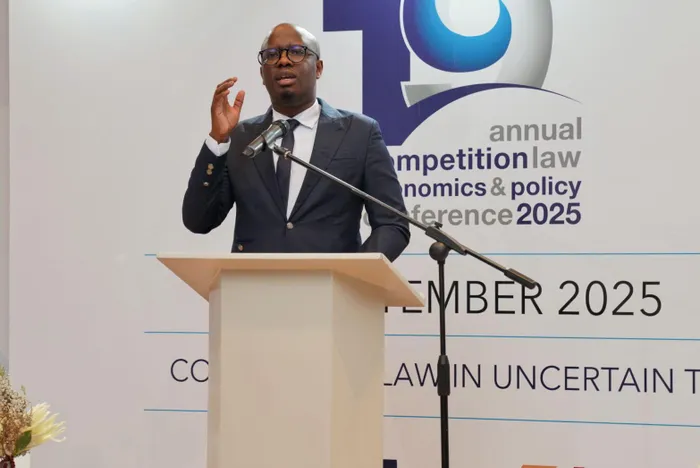
Deputy Minister of Trade, Industry and Competition, Zuko Godlimpi, defends the DTIC’s response to Goodyear’s closure, pointing to anti-dumping and anti-circumvention duties aimed at protecting local manufacturers from unfair imports threatening jobs and industrial capacity.
Image: Supplied
Deputy Minister of Trade, Industry and Competition Zuko Godlimpi says the government is taking concrete steps to protect South Africa’s domestic tyre manufacturing industry, following the closure of the Goodyear plant in Kariega and broader pressures facing the local automotive sector.
Godlimpi told Parliament on Wednesday, during a session where ministers in the Economic Cluster were responding to questions from MPs.
Godlimpi said that the Department of Trade, Industry and Competition (DTIC) is "deeply concerned" about the closure of the Goodyear facility, which threatens approximately 900 jobs.
He said the DTIC, along with the Industrial Development Corporation (IDC), had met with Goodyear as recently as 3 September 2025 and had expressed interest in acquiring the plant.
However, Goodyear indicated the closure process was already finalised and the company was unwilling to transfer its technology to any new owner.
“Without a technical partner, there is no credible offer that can be put on the table,” said Godlimpi.
He explained that efforts were ongoing to secure such a partner, and that a potential investor was only expected in the country in December, which would be too late to prevent the planned shutdown on 15 October.
He added that Goodyear’s exit was not unique to South Africa, noting that the company had also announced plant closures in Malaysia and Germany as part of a global cost-cutting strategy.
“Goodyear is increasingly relying on imports from its overseas plants in Thailand, Indonesia, China, and Taiwan,” he said.
The original question, posed by ANC MP Lufefe Mkutu, asked the Minister to explain why the department was unsuccessful in preventing the closure of the Goodyear plant and why anti-dumping duties on tyres imported from China had failed to shield Goodyear and ContiTech Africa from opportunistic pricing that threatens the local industry and jobs.
ANC MP Mikateko Mahlaule, taking the supplementary question on behalf of Mkutu, warned that the Goodyear closure marked the second major tyre plant shutdown in recent times and was part of a broader trend of de-industrialisation.
Mahlaule asked for details on what trade measures the department was considering to safeguard the domestic tyre industry, particularly in light of the 20% unilateral tariffs imposed by the United States on South African tyre exports.
In response, Godlimpi said the department had already implemented trade defence measures. “We’re not contemplating what to do. We’ve already started doing something,” he said.
He pointed to the anti-dumping duties imposed on Chinese imports in 2023, followed by anti-circumvention duties introduced in May 2025 on tyres from Vietnam, Thailand, and Cambodia, after evidence emerged of efforts to bypass the original tariffs.
'It was the anti-dumping duties that we imposed, and then it became clear that some countries were engaging in creative ways to circumvent them. Around May, for 200 days, we imposed anti-circumvention duties on imports from Vietnam, Thailand, and Cambodia to provide urgent relief, counter transshipment practices, and restore the effectiveness of the original anti-dumping measures.''
The International Trade and Administration Commission (ITAC), he added, is in the final stages of concluding its investigation, with a final determination expected soon. He assured Parliament that South Africa remained within World Trade Organisation limits, which allow up to a 25% ceiling on such duties.
DA MP Toby Chance also raised concerns about the broader automotive sector, asking how the DTIC was responding to the influx of Chinese motor vehicle imports and whether the government was pushing for those companies to localise production.
Godlimpi acknowledged the pressure on local manufacturers but downplayed the effect of US tariffs, saying most South African auto exports are not destined for the US market. He said that the real crisis stemmed from economic pressures in Europe.
He revealed that the department was in talks with several Chinese firms, particularly in the electric and hybrid vehicle segments. “There was one Chinese firm that came to South Africa in August and had a discussion with the department with an interest to establish operations in the Eastern Cape,” said Godlimpi.
He stressed, however, that rebuilding the sector and securing large-scale investment would take time. “That is not something that you can do in a matter of a month or two,” he said, referring to both attracting investment and regulating imports to protect local production.
“We’re also trying to move up to the highest ceiling of import duties to ensure that cheap imports do not price out South African-manufactured cars,” he said.
Godlimpi said the DTIC would continue to work with unions, investors, and industry stakeholders to stabilise the tyre sector and prevent further job losses.
hope.ntanzi@iol.co.za
IOL Politics